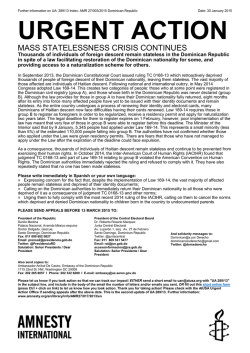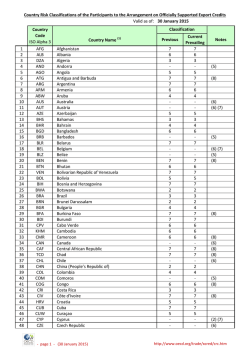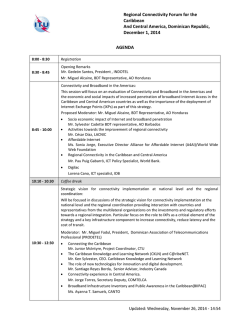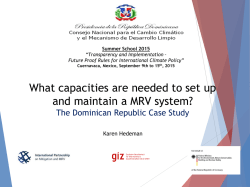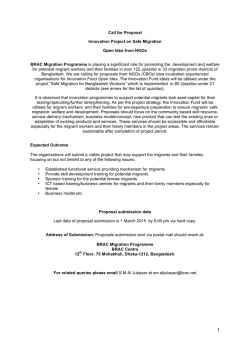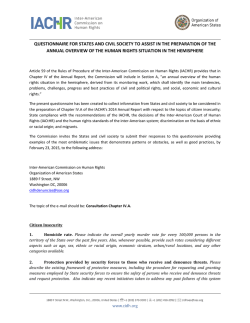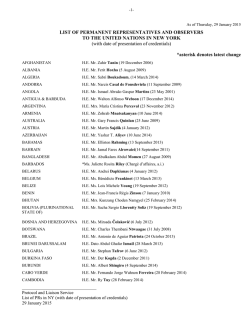
URGENT ACTION - Amnesty International
UA: 20/15 Index: AMR 27/002/2015 Dominican Republic Date: 28 January 2015 URGENT ACTION MASS DEPORTATION IN THE DOMINICAN REPUBLIC On 27 January, 51 people, including 30 Dominican-born children, some of their mothers and 14 other adults were deported without due process to Haiti from the Dominican Republic. More mass deportations of Dominicans of Haitian descent and Haitian migrants are feared. On the morning of 27 January, two mini-buses transporting 30 children aged between seven and 13, all born in the Dominican Republic, accompanied by some of their mothers (7 Haitian women) and 14 other Haitian migrants were travelling with religious officials to San Juan de la Maguana in eastern Dominican Republic. Following a ruling issued by the Dominican Constitutional Court in 2013 that rendered tens of thousands of people of foreign descent stateless, the mothers intended to enrol the children in a naturalization scheme established by the Dominican government in May 2014 to regularize the situation of Dominican children of irregular migrants. The 14 other Haitian migrants sought to enrol in the National Regularization Plan for Foreigners with Irregular Migration Status, established in 2013 for undocumented migrants living in the Dominican Republic. Around 20 kilometres before reaching San Juan de la Maguana, where the nearest offices that process enrolment for both naturalization and regularization processes are located, the mini-buses were stopped at a military checkpoint. The military officers denied the group access to the city for being “undocumented migrants”. Following negotiations with the religious officials, they were asked to obtain a pass at the office of the Migration Directorate in Elias Piña near the Haitian-Dominican border. Once they arrived at the Migration Directorate office, they were detained and accused of being illegal wanderers. The authorities ordered their immediate deportation to Haiti without giving them the opportunity to have their cases individually examined, and therefore be able to challenge the legality of their detention or appeal the decision. Following pressure, in the evening the Dominican Ministry of Interior gave authorization to the whole group to reenter the country. They were still on Haitian territory on the morning of 28 January. The 30 children are in a particular situation of vulnerability as they do not hold Haitian citizenship and remain stateless. Please write immediately in Spanish or your own language: Calling on the Dominican authorities to allow the group to enrol in the naturalization and regularization schemes according to their wishes; Urging them not to use naturalization and regularization procedures to detect alleged undocumented migrants and to stop all deportations of similar measures against applicants in the naturalization and regularization schemes; Urging them to fulfil their obligations under international law, which prohibit arbitrary and collective expulsions, and to ensure that all those facing removal from the Dominican Republic have their cases individually examined in a fair and transparent procedure, where they can challenge the authorities’ decisions and have their case reviewed. PLEASE SEND APPEALS BEFORE 11 MARCH 2015 TO: Minister of Interior and Police José Ramón Fadul Av. México esq. Leopoldo Navarro Edificio de Oficinas Gubernamentales Juan Pablo Duarte Santo Domingo, República Dominicana Email: [email protected] Salutation: Señor Ministro / Dear Minister Director of Migration Lic. Jose Ricardo Taveras Dirección General de Migración Avenida 30 de Mayo, Esquina Héroes de Luperon, Santo Domingo, República Dominicana Fax: +1 809 534 7118 Email: [email protected] Salutation: Dear Director Minister of Foreign of Affairs Andrés Navarro García Ministro de Relaciones Exteriores Avda. Independencia No.752 Santo Domingo, República Dominicana Fax: +1 809 985 7551 Email: [email protected] Salutation: Dear Minister Also send copies to diplomatic representatives accredited to your country. Please insert local diplomatic addresses below: Name Address 1 Address 2 Address 3 Fax Fax number Email Email address Salutation Salutation Please check with your section office if sending appeals after the above date. URGENT ACTION MASS DEPORTATION IN THE DOMINICAN REPUBLIC ADDITIONAL INFORMATION In September 2013 the Dominican Constitutional Court established that Dominican children of irregular migrants born in the Dominican Republic between 1929 and 2010 had never been entitled to Dominican nationality and had to be stripped of it (ruling 168-13). The vast majority of those affected are Dominicans of Haitian descent. Following national and international outcry, in May 2014 the Dominican Congress adopted Law 169-14, which created two categories of people: those who at some point were registered in the Dominican civil registry, and those whose birth was never declared. According to the law, individuals belonging to the second group are required to register themselves as foreigners and they will be able to apply for naturalization only two years after having been regularized. In parallel, the government has been carrying out a process for the regularization of migrants without regular migration status. Following an initial preparatory phase, the second phase of the National Regularization Plan for Foreigners with Irregular Migration Status started on 1 June 2014, giving migrants 12 months to apply for regularization. Article 37 of the presidential decree for the implementation of the National Regularization Plan for Foreigners with Irregular Migration Status made it clear that no migrant who had applied to the Plan could be deported during the time of its implementation. In October 2014 the Inter-American Court of Human Rights (IACHR) handed down a ruling calling on the Dominican Republic to provide redress for human rights abuses suffered by Dominicans of Haitian descent and Haitians as a result of illegal deportations, denial of identity documents and arbitrary deprivation of nationality, among others. However, the Dominican government formally rejected the regional court’s ruling, dismissing it as “out of season, biased and inappropriate”. Only two weeks later, the Dominican Constitutional Court issued a new ruling that could lead to the country’s withdrawal from the Inter American Court of Human Rights and deprive hundreds of thousands of survivors of human rights abuses from any hope of justice. Arbitrary and mass deportations of Haitian migrants are common practice in the Dominican Republic. Amnesty International has documented numerous cases of people being arbitrarily expelled from the Dominican Republic in recent years. Local human rights organizations report that most of the expulsions that are regularly carried out are arbitrary and do not comply with international human rights standards. This practice of collective expulsions means that Haitians and Dominicans of Haitian descent in the Dominican Republic live in constant fear of being expelled, without an effective opportunity to challenge the decision to do so. At the beginning of 2015, the Dominican authorities launched “Operation Shield” (Operación escudo), a mass-scale deployment of security forces in the border areas, with the aim of halting the entry? of those without regular status. Since the beginning of the year, the authorities have announced having repatriated more than 22,000 individuals, the vast majority to Haiti. According to Dominican human rights organizations, among those repatriated there are also individuals who had already applied to the ongoing National Plan of Regularization of Foreigners with Irregular Migration Status. Collective expulsions also contravene the Protocol of understanding on the mechanisms of repatriation agreed by the Dominican and Haitian governments in December 1999. In signing the Protocol, the Dominican Republic undertook to improve its deportation mechanisms and made a number of specific commitments, including to avoid separating nuclear families during the process of repatriation and to allow those being deported to collect their belongings and keep their identity documents. Name: 51 people, including 30 children with their 7 mothers and 14 other adults Gender m/f: both UA: 20/15 Index: AMR 27/002/2015 Issue Date: 28 January 2015
© Copyright 2026
